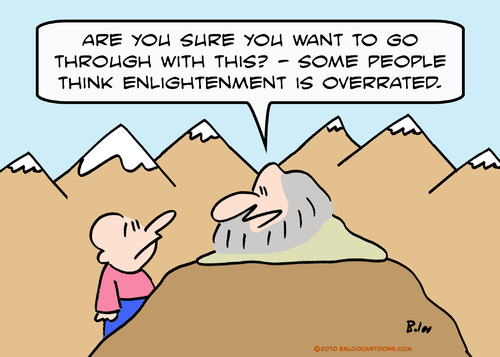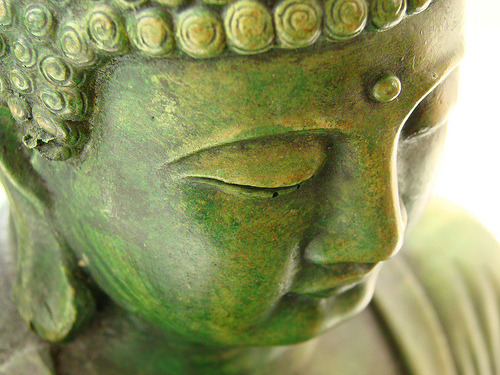I think you are going down the same route many Eastern philosophies are.
For part I click here
Where we have argued with spiritual folk in the past, has been on the merits of our status in relation to the main traditions. Now we can start to outline some conceptions and address them.
Of course we would be ignorant to say that seeing no self is the end of our search and we are fully truth realised, or whatever criteria you may think it takes to say we are fully 'enlightened'.
This is evident, since we are trying to establish a post self framework and we will certainly admit that after seeing no self, the work really begins in coming to terms with your new found freedom.
Learning how to live life again post-self requires facing up to the truth, which seems to be just as important as realising no self. This is because what we have always lacked, was the de-conditioning work that the other traditions such as Buddhism and Advaita have focussed on.
No one has doubted that we have undergone a paradigm shift in the way in which we see the world. I think this can be clearly evidenced by the fact that what we say is consistent, coherent and also dovetails with the insights of all the spiritual traditions perfectly.
What we say across our blog roll, our clarity of vision and our penetrating insights, would all point to the same thing.
Were there to be an element of untruth about what we had experienced, then there would certainly be chasms of ambiguity in what we were saying and we would have been torn to bloody pieces by our critics.
Whilst we are exploring the post self world, we do sometimes make mistakes as we explore our new found freedom, however, the core of what we have said is unshakeable, and these critics have more often than not galvanised the strength of this insight, and made us realise the power of this insight.
We can always point to one simple truth every time which is the notion that the self is an illusion.
So are we enlightened by Buddhist and Advaitan standards?
The simple answer is no.
Do we care about becoming enlightened?
The simple answer is no we do not care.
However, if we were to break down our conditioning further, then it maybe that we would be enlightened by their same standards, which are; annihilate your ignorance, and see the self for what it really is.
The reason we do not fulfil their criteria presently is because we have not removed our conditioning, and have only started to demolish the complexes of hubris that we have accumulated through our lives.
Also, we do not accept the auxiliary metaphysical assumptions that they do. We are peeling the layers of old complexes away still and it is safe to say we still have some questions to ask.
By Zen and Neo - Advaitan standards though, we certainly seem to conform to their version of 'enlightened'.
It is not a simple case of seeing no self and your ego vanishes. It is a case of measuring everything against the standard of actual reality and not our preconceived notions of what reality is.
That is the most important thing post-self, and this is where your false beliefs and judgements are challenged.
In this respect, we operate backwards to Buddhism and Advaita, where we see the final realisation and then work on our conditioning afterwards.
One thing we have maintained from the very beginning is this one thing.
Nobody has an exclusive monopoly over the truth.
We need to be crystal clear on this aspect. For all that anyone has said detractor or otherwise, nobody can have exclusive access to the truth. Maybe they offer different methodologies to access the truth but truth is universal to anyone who is willing to look in real life.
The truth cannot be hidden by obscure concepts, riddles and systems of worship any more, once it is realised the truth was always there right in front of us the whole time. We have simply found a short cut to seeing this truth, obviously some people are not going to like this fact, particularly when it undermines their religion.
If you were to deliver a very uncharitable analysis of our insight, you could accuse us of discovering a life hack where you are able to:
- Live a life without being bound tightly to the ego
- Have the ability to see that your notions of suffering are the result of fantasy
- Have the ability to dissolve negativity before it arises by measuring it against reality
- Be free from the need for bolstering a flaky self image and self esteem
- Be non attached to outcomes and desires
- Have a degree of serenity and clear insight in to the human condition
- Live an authentic life in line with your basic drives
If you wanted to give us the most charitable interpretation, then you might say we are 'enlightened'. The reality I think, is somewhere in between these two extremes, because we can draw many parallels between us and the east but we can also openly admit and embrace where we differ.
You can choose, maybe you are not enlightened but you have the above benefits? Sounds like a worthwhile life hack to me, if that is as uncharitably as you want to interpret it.
Since we began this journey, we have been surprised by the number of people who had never encountered any spiritual teachings in their life, but had already realised the insight of no self, before they had come across us. We were also surprised by the number of people from the spiritual community who were dead against us freeing people, and would rather wallow out contemplating the lilly, while the rest of humanity was left to suffer.
We were surprised further by the fact they either shrugged their shoulders and admitted that they didn't care, or tried to claim that what we were doing was dangerous and only they had special access to the truth.






















